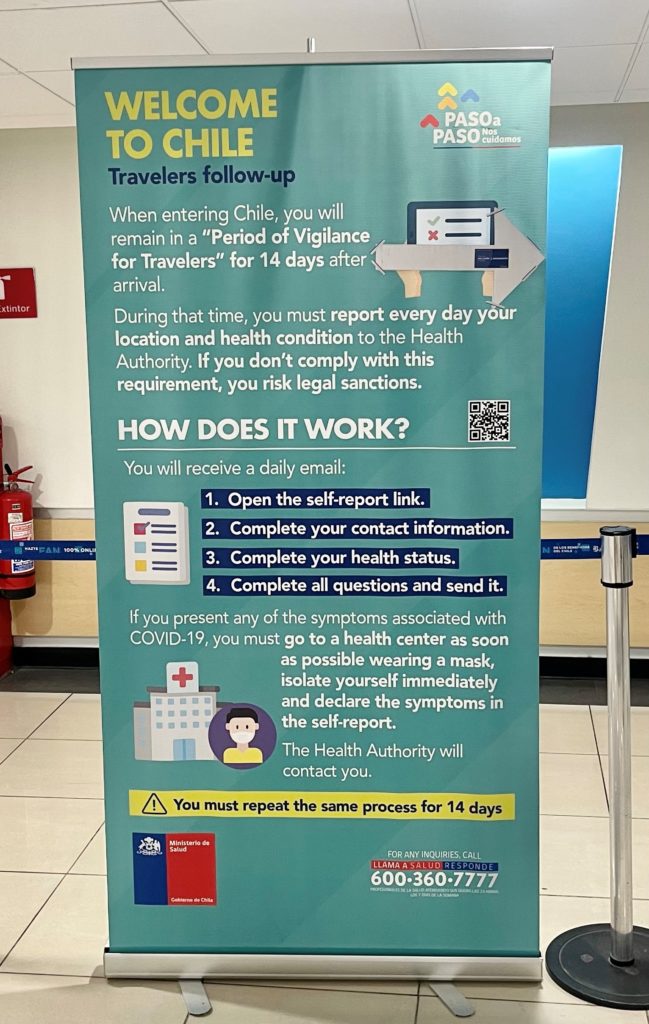
I’ve been traveling internationally a lot in the past few months, including travel to Costa Rica, Egypt (transiting through Qatar), Budapest (transiting through the United Kingdom and the Netherlands), and, most recently, Chile. Following each country’s Covid-19 requirements adds a whole new dimension to travel that is often arduous and confusing.
I booked a trip to Santiago, Chile back in February 2021 after I received my second Pfizer vaccine. The flight from New York to Santiago was around $450 round trip in Premium Economy class – a very good deal. For a long time, I didn’t know if the trip would actually happen because Chile had closed it’s borders to foreign visitors (or required lengthy quarantines).
Then, in mid-October, it was announced that Chile will allow vaccinated international visitors to enter starting November 1. I was excited that this trip was really going to happen. The requirements for travel sounded simple, but in reality were rather onerous and confusing.
For an international visitor to enter, the visitor had to prove that she or he was fully vaccinated, had proof of a health insurance policy that provides coverage for COVID-19 (minimum USD $ 30,000) during the traveler’s stay in Chile, and had a negative PCR within 72 hours before entering the country. If all of this (which included the submission of no less than two forms to the Chilean Ministry of Health), plus another negative PCR upon arrival, was met, the traveler would obtain a Mobility Pass (Pase de Movibilidad) essentially allowing the traveler to travel freely, without quarantine, within Chile. Theoretically.
First, you have to submit an application to Chile’s Me Vacuno website, including proof of vaccination. The Chilean Ministry of Health was backlogged, and getting this first approval is taking as long as 3 weeks. As I understand it, many people had to cancel their trips because they did not receive this first level of the approval process in time. I received my approval, which includes a QR code, about 5 days before my flight.
The email stated:
Your request has been successfully validated. Before boarding, at the time of issuing your affidavit for entry to Chile (www.c19.cl), you must enter the register the same identification number XXXXX and your vaccine validation will be automatically reflected.
Then, once you are in Chilean territory, your Digital Vaccination Pass will be available and your “Pase de Movilidad” will be enabled once the days of your mandatory traveler isolation have expired. To download it, you must enter to https://mevacuno.gob.cl/, where you can obtain the document containing the QR code corresponding to your “Pase de Movilidad”, which you can use within Chile. The “Pase de Movilidad” will be enabled for 90 days and after this time it will expire, and it will be activated every time you enter to our country.
The second step in this process is to take a COVID-19 PCR test 72 hours prior to travel.
Third, within 48 hours of travel, to complete an online Travelers’ Affidavit form known as a C19 form. The form asks for travelers’ contact information, medical history, and previous travel history. The form goes on to ask where the traveler will isolate for quarantine (the discussion of isolation in the C19 form seemed somewhat contradictory with my understanding that no quarantine would be necessary if a traveler met all of the requirements for issuance of the Mobility Pass).
The day prior to my travel, I received a confirmation email, with another QR code which stated:
You have made your International Affidavit. This voucher will be valid for the Sanitary Control upon entry to Chile for 48 hours from its issuance, that is, until 26-11-2021 14:40 (GMT -4).
It will be requested upon your arrival to Chile by the health authority, together with the rest of the necessary travel documents.
I then input all of the information into the Verifly App which I hoped would make the process easier. I made copies of all of the documents, including my proof of insurance coverage (obtained by calling Allianz Travel Insurance). I was checked for these affidavits and documents at every point of departure – both at La Guardia airport and Dallas Fort Worth airport.
Upon arrival in Santiago, Chile, before even going through passport control and customs, we were lined up and met with a representative who reviewed each of our documents.
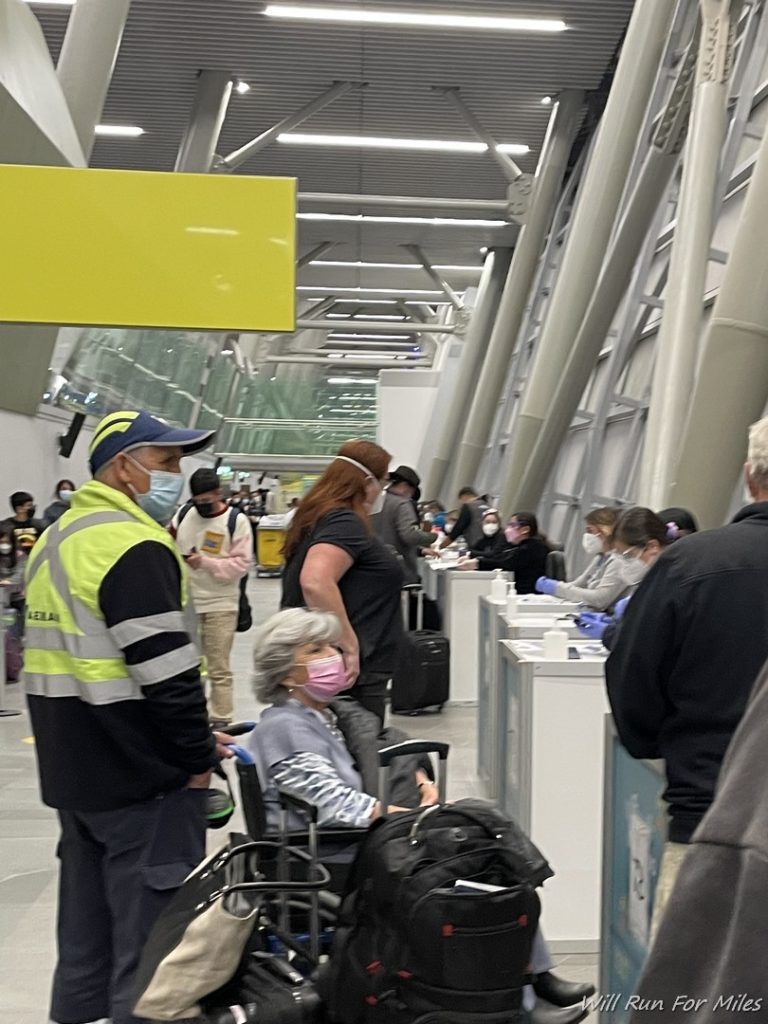
Once the representative was satisfied with our proof, we were given a sticker to wear.
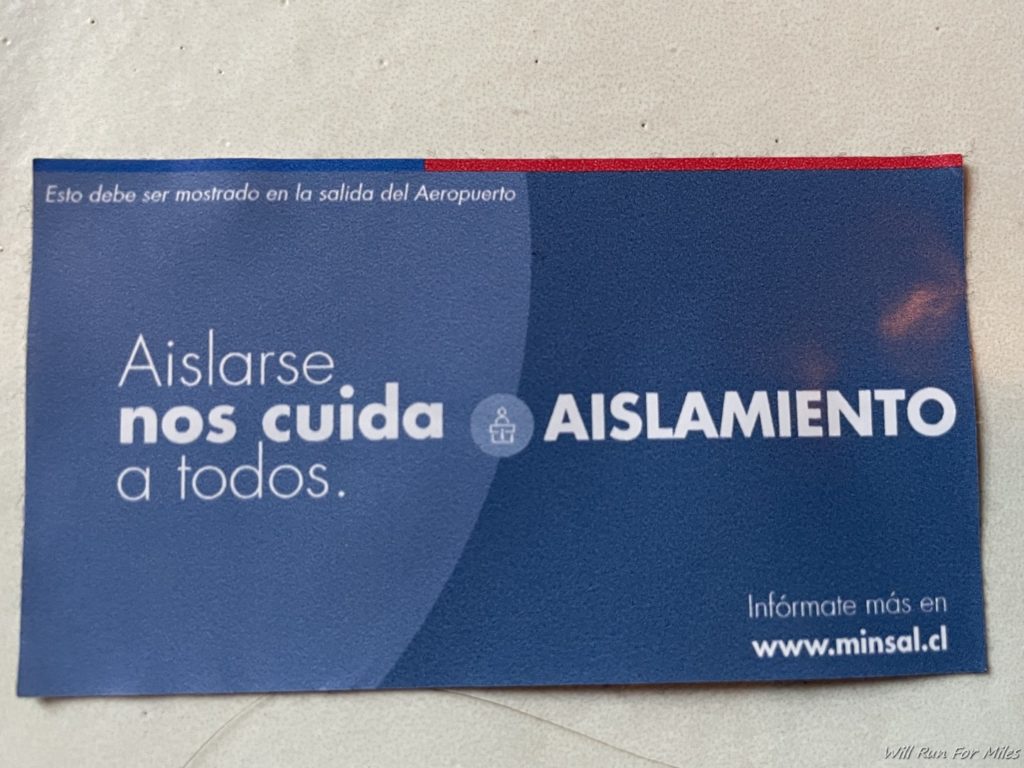
Then, we went in another line, this time to receive our PCR on arrival. The process was rather orderly.
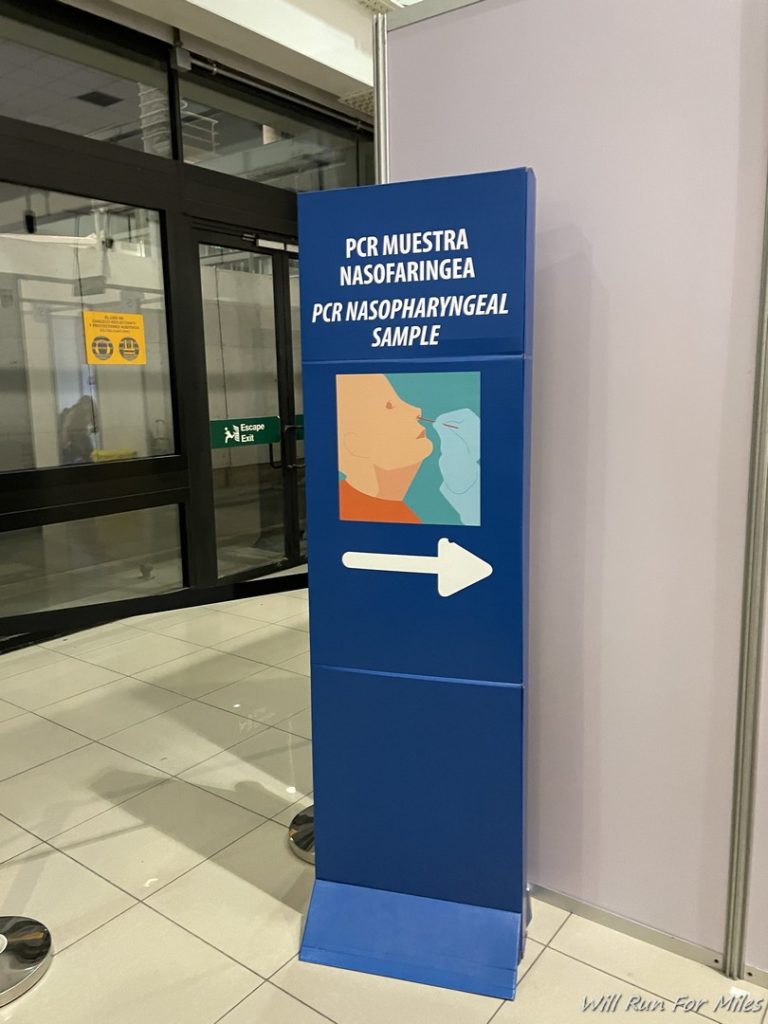
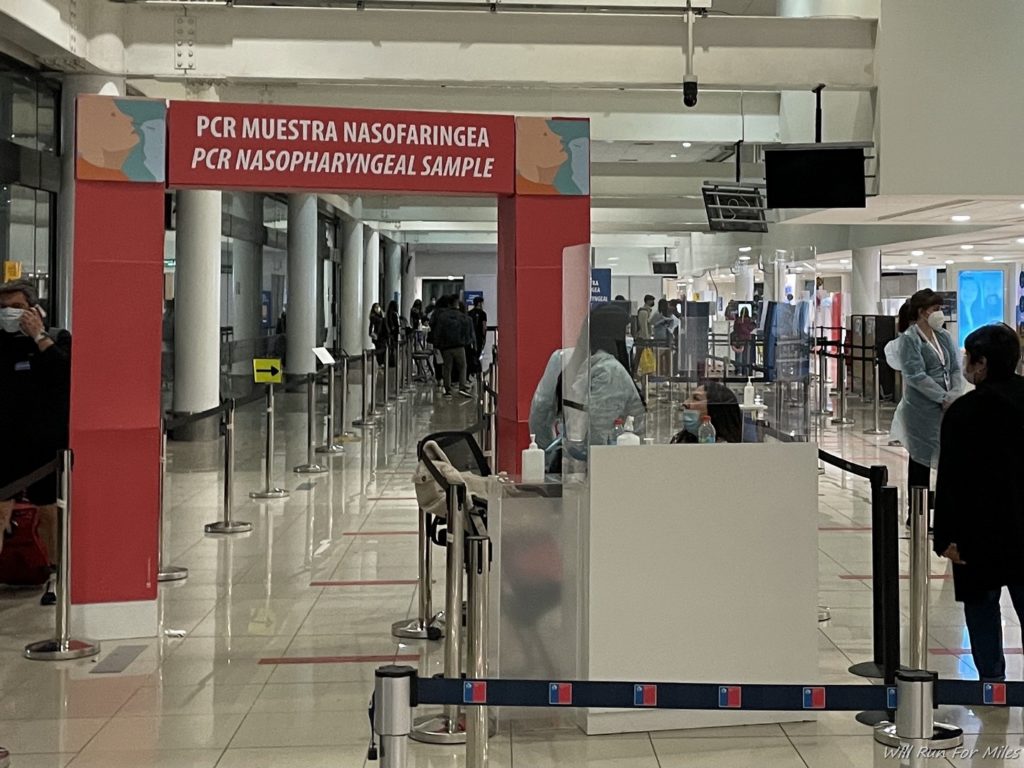
After waiting on line, I went into an individual room, where a tester, dressed in full PPE gear, took my PCR test. The test was interesting in that the tester first put the swab in my throat, and then in my nostrils.
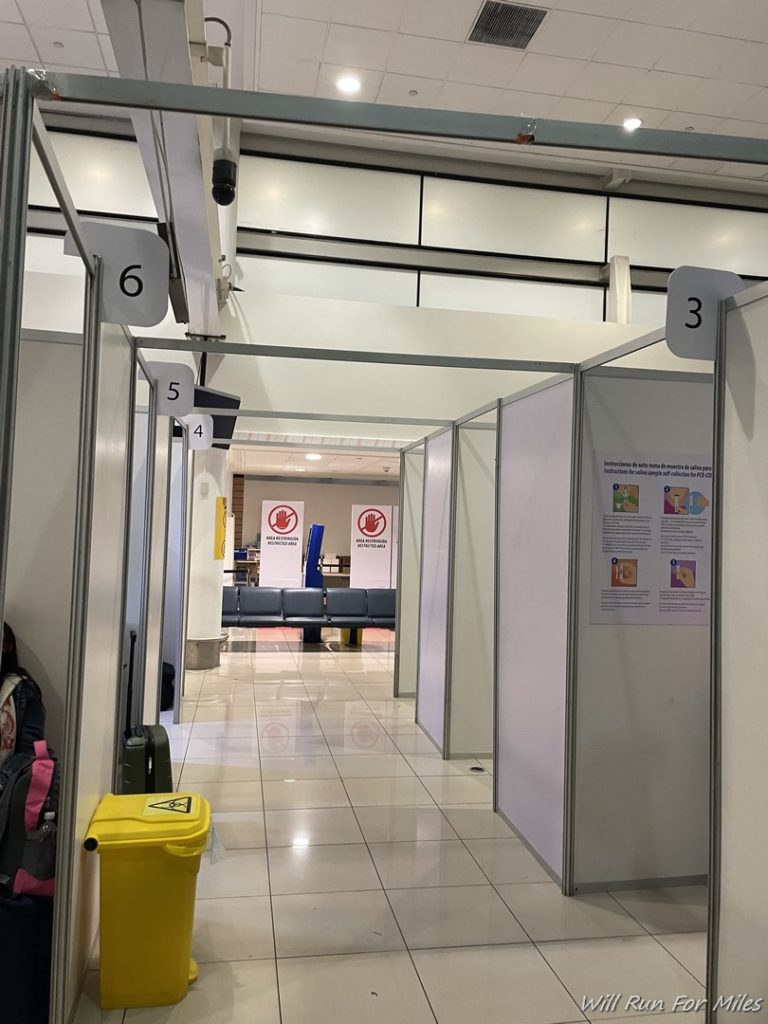
![]() I was given a receipt with instructions on how to obtain the results.
I was given a receipt with instructions on how to obtain the results.
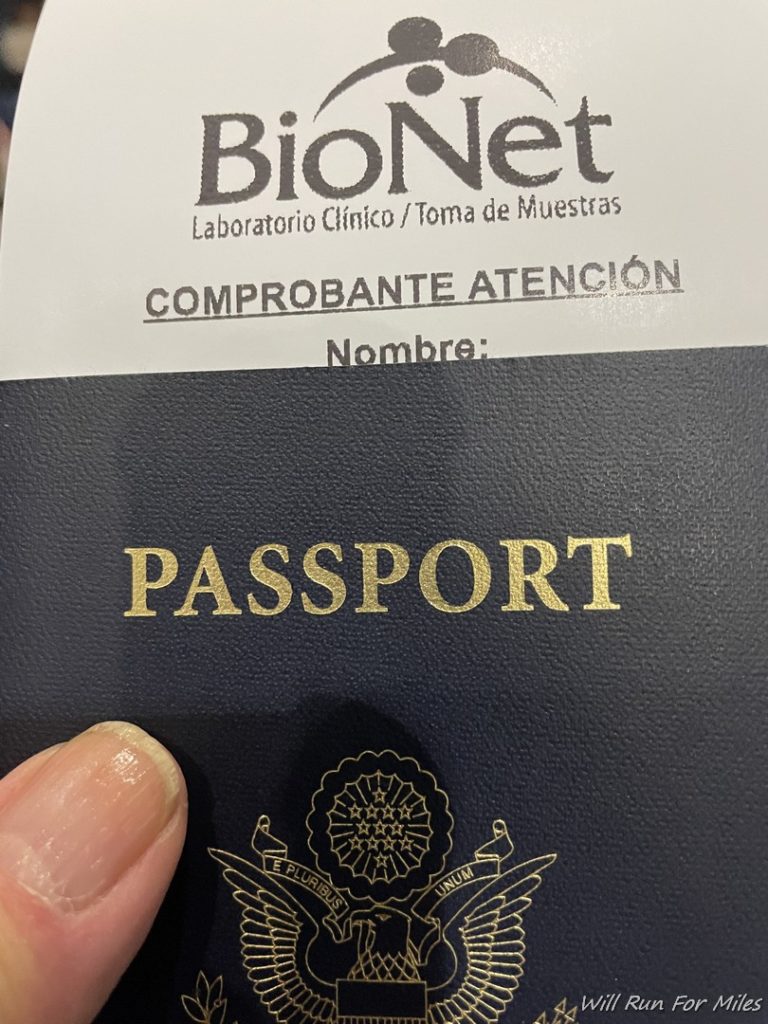
Here’s where the situation got confusing. As I understood it, we were supposed to isolate (i.e., quarantine) until we received a negative result for the PCR test and then Chile would issue a Mobility Pass.
However, the email we received from Chile spoke only of a mandatory 5-day isolation.
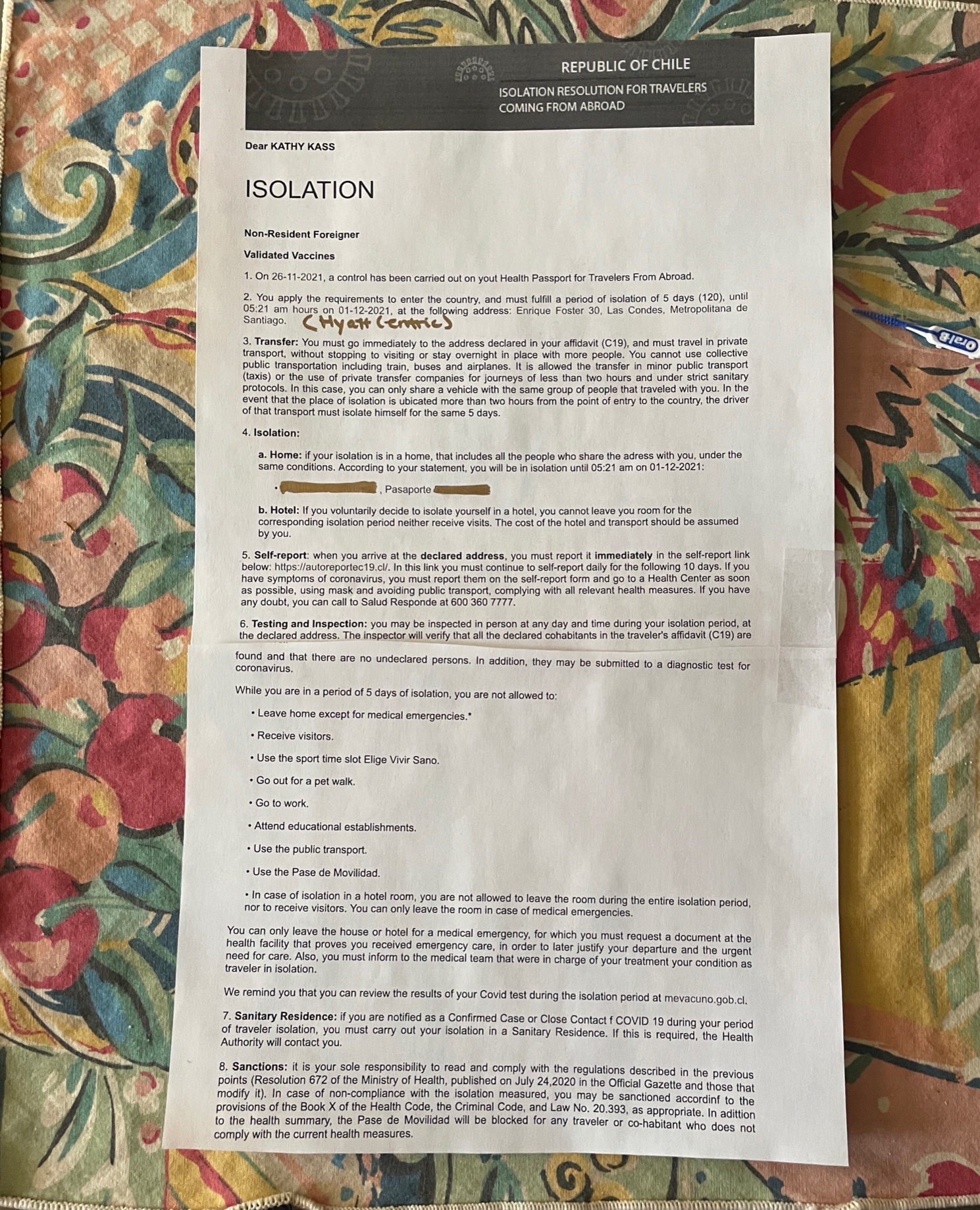
We took this to mean that, upon receipt of a negative PCR result, Chile would issue a Mobility Pass. However, although we received notice that the PCR test result was negative, we never received notification that the Mobility Pass was issued. Without a Mobility Pass, we were technically required to continue isolating.
Our hotel as well as friends who spoke Spanish called the Chilean Ministry of Health Hotline for us, but no one could get a straight answer. We weren’t sure of what to do, but went out anyway, thinking that we were entitled to Mobility Passes even if none were issued. I note that, although we visited many stores, restaurants and took public transportation, at no time did anyone ask us for proof of a Mobility Pass.
In retrospect, I now believe that the QR code issued prior to arrival must have in fact been the Mobility Pass and that no formal issuance of a Mobility Pass, after the negative PCR result on arrival, was required. It just wasn’t clear! If a country wants to encourage vaccinated travelers to visit, they need clear rules and instructions.
I hope that my experience will help you to understand the Covid-19 requirements, forms and procedures if you are planning a trip to Chile.
 A New York frequent flyer who elegantly combines her passions for worldwide travel, running a gazillion marathons all over the globe and staying fit ... without sacrificing her fancy for good wine and food.
A New York frequent flyer who elegantly combines her passions for worldwide travel, running a gazillion marathons all over the globe and staying fit ... without sacrificing her fancy for good wine and food.
Still waiting for my kid’s mobility pass sent a week ago (as of 12/5), while my wife and I received ours (we filed them early while waited for kid’s eligibility to get the vaccine). All U.S. Citizens. We both received a QR code pass which they say to bring printed. The QR pass, as we understand it, is not valid until you get to Chile. The QR code pass goes live with the negative PCR result taken at the airport. Once that step is complete you are legal to leave the quarantine. PCRs at the airport results taking 6-12 hours. I feel your pain the Ministry of Health of Chile information in their website is awful, and the translation to English was made by a kindergartner.
There are actually two QR codes. You’ll get the second one when Chile accepts/approves your C19 affidavit.
We had to cancel our trip because we didn’t receive the mobility pass in time. A week and half later, my husband was approved but mine was denied. Ended up going to Spain instead. Still salty having to cancel the trip as it was a great deal and I have been wanting to go to Chile for a long time.
If they want to promote visits by foreigners, they need to have clearer instructions, and have sufficient employees to review the applications within a reasonable amount of time.
FUCK THESE FASCISTS. I hope Boric wins…because if he doesn’t, it’s the end of Chile and the Nazis will rise in Chile. What a fucked up place! Never going back.
Thanks for the info, I agree not all info is very clear online. I’d like to confirm if there is an expiration date. We submitted and were approved back Decem 31st but our flight (rescheduled) isn’t until Feb 18th. Looking for confirmation or guidance!
I don’t know the answer but I would probably reapply just to be safe.
It doesn’t allow you to reapply. I think I would have to wait until it expires.
Another concern we have is the daily verification. We are going to Patagonia to hike and will not have access to our emails. We therefore will not be able to do a daily check in. Is that going to create some major issues?